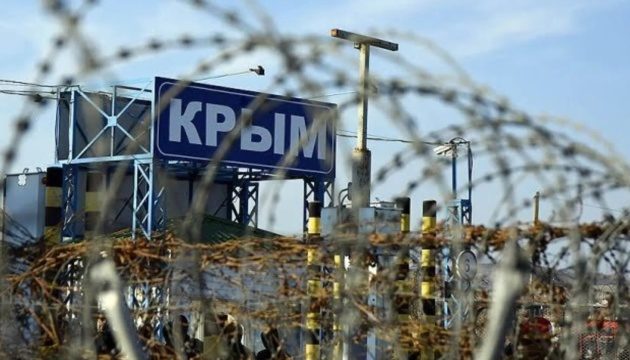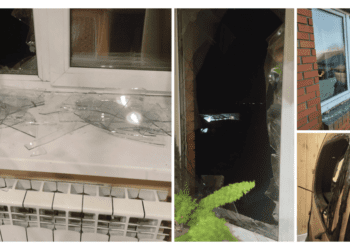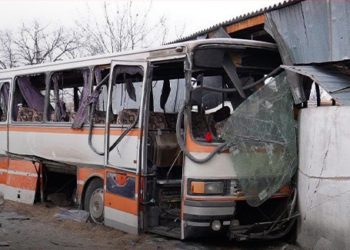The sentence against the Crimean citizen journalist Ernes Ametov and his colleagues is a vivid example of the injustice and illegality of the russian policy of occupation in Crimea.
“Today, Ernes, my dear husband, is 39 years old. I admire his spirit and his courage. We are very sad; we are rooting for his condition, health, and well-being; this separation is exhausting us. The heart cries without him. I am begging the Lord to strengthen his health and protect him in torture camps, in captivity,” his wife Eleonora Ametova told journalists the other day. Colleagues of Ernes Ametov, on behalf of the public association Crimean Solidarity, wish Ernes Ametov strength, patience, good health, and a speedy liberation!
According to the President of NUJU, Sergiy Tomilenko, who is pushing for the undisputed release of all illegally convicted prisoners, primarily journalists, “the path to the release of civilians in times of war is difficult, but one cannot remain silent.” He stated this during a recent meeting at the Geneva headquarters of the Red Cross.
“The release of every journalist from russian captivity is a priority for the NUJU,” emphasized Sergiy Tomilenko.
He told the representatives of the international organization about how the NUJU documents russia’s war crimes against journalists, as well as about actions of solidarity with captured colleagues, which the Union conducts at the national and international levels. The parties agreed on joint actions for the release of illegally convicted civilians.
“Unfortunately, at least 30 Ukrainian journalists are currently in captivity,” stated the President of NUJU. “The International Committee of the Red Cross has a special mandate. Through the receipt and verification of information, families of captured Ukrainians at least receive confirmation that their relatives are alive. They get hope.”
Ernes Ametov is a photographer from Bakhchysarai, the father of two minor children. In October 2017, FSB officers searched the homes of Muslim Crimean Tatars in Bakhchisarai. As a result, six people were detained. Among them was Ernes Ametov. In 2020, the Rostov-on-Don military court acquitted Ametov. But in March 2022, the russian Court of Appeal sent the case back to the court of first instance for a new trial. In May 2022, Ernes was arrested again right during the trial at the Southern District Military Court. In November 2023, the appellate military court in the village of Vlasikha upheld the sentence of citizen journalist Ernes Ametov – 11 years of imprisonment in a high-security prison.
As earlier reported, on October 11, 2017, six Crimean Muslims were searched in Bakhchisarai. Ernes Ametov, Seyran Saliev, Marlen Asanov, Timur Ibragimov, Server Zekeriyaev, and Memet Belyalov were unjustifiably arrested. They were accused of organizing and participating in the activities of a terrorist organization. However, the “terrorist organization” itself was not identified; it was served by the Hizb ut-Tahrir party sheltered in russia. Later, all those arrested for refusing to comply with the demands of the investigators were accused of an absurd crime – preparation for a violent seizure of power by an organized group based on a prior conspiracy. Thus, these Crimeans have been behind bars for more than two years due to unfounded accusations. According to the lawyers who work with this category of cases, during the entire investigation, no proof of guilt and involvement of the defendants in terrorist acts or violence was submitted. The conviction was based on the testimony of a “secret witness” and the conclusions of a falsified religious examination. Moreover, the religious examination was performed by experts in the field of cultural studies and philology who do not have deep knowledge of religion, particularly Islam.
The Southern District Military Court in Rostov-on-Don announced the verdict in the second Bakhchisarai case of Hizb ut-Tahrir. The extras were given a term of 13 to 19 years. Ernes Ametov was initially acquitted and released in the courtroom. The prisoners were transferred to Remand Prison 3 in the Rostov Oblast to Novocherkassk.
According to the case materials, the defendants did not have weapons, explosives, or ammunition, did not plan to commit a terrorist act, and did not call others to commit terrorist acts. There is no evidence of an attempt to overthrow the constitutional system of the russian federation and seize power. The case materials contain audio recordings on which it was recorded that the convicts held discussions on religious and political topics. Which, in fact, was the only evidence of a “terrorist crime.”
According to the Crimean Solidarity non-governmental organization, more than 100 people have been arrested, are under investigation and sentenced in Crimea on similar charges. The number of people who are sentenced to ten years in prison, despite the fact that even according to the version of the investigation, they did not commit, did not prepare, or plan any terrorist acts, is only increasing, arrests on these charges in Crimea are increasing every year.
According to the Memorial Human Rights Center, which has been monitoring various forms of pressure on Muslims in russia for 15 years, and after 2014 and in Crimea, “state propaganda uses and reinforces everyday Islamophobia, fuses Islam and terrorism in the minds of ordinary people. Civilian control over such prosecutions is minimal; special services get the opportunity to repeatedly overestimate the indicators of the detection of terrorist crimes (their usefulness), manipulate perceptions of the terrorist threat, and replace real anti-terrorist work with an imitation of this work. After the appearance of Article 205.5 of the Criminal Code of the russian federation, the “disclosure” of serial cases about membership in Hizb ut-Tahrir has become extremely simplified. Achieving “high results” requires minimal effort – a person must be accused of being involved in Hizb ut-Tahrir. Then, it is not necessary to prove that this particular person is a terrorist. At the same time, in recent years, the adoption of laws limiting the constitutional rights of citizens is explained by anti-terrorist considerations.
Russia’s anti-extremist and anti-terrorist legislation is consistently turning into a repressive tool for fighting dissent and peaceful assemblies.
NUJU Information Service

 THE NATIONAL UNION OF
JOURNALISTS OF UKRAINE
THE NATIONAL UNION OF
JOURNALISTS OF UKRAINE
















Discussion about this post